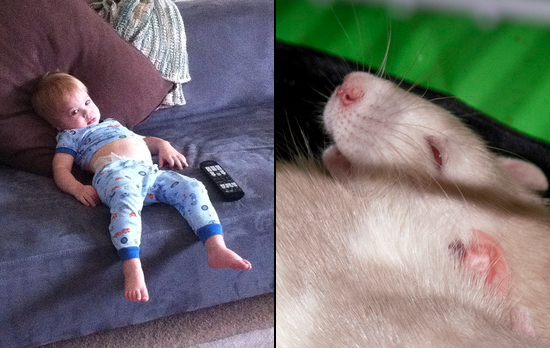Being Lazy May Not Be Your Fault, Say Scientists Who Aren’t
Good news, couch potatoes! It may not be your fault that you don’t want to get off your butt and be productive. In a display of not at all being lazy themselves, researchers at the University of Missouri have deduced that genetic traits might make some people prone to low motivation and inactivity.
While I like to imagine scientists in white lab coats hooking up wires to chubby guys lounging on sofas, Professor Frank Booth and post-doctoral fellow Michael Roberts did, in fact, turn to proper scientific methods in their study. Both researchers at the MU College of Veterinary Medicine, they used selective rat breeding to investigate the matter.
Here’s what they did: Rats in cages were given running wheels. Booth and Roberts measured how much time each rat was willing to take to the wheel during a six-day time span. 26 of the top runners were bred with each other, and 26 of the rats who lounged around the most were bred with each other, again and again through 10 generations.

What if the rats thought they were participating in a philosophical study on circular logic? How sad that would be.
By the tenth generation, the line of noble Olympian runner-rats chose to run on their wheels 10 times more than the lounger-rats did. Booth and Roberts then went to town on the rats’ physiological stats, studying mitochondria levels in muscle cells, general body compositions, and the genetics of their RNA deep sequencing.
Roberts said:
“Out of more than 17,000 different genes in one part of the brain, we identified 36 genes that may play a role in predisposition to physical activity motivation.”
While Booth said:
“We have shown that it is possible to be genetically predisposed to being lazy. This could be an important step in identifying additional causes for obesity in humans, especially considering dramatic increases in childhood obesity in the United States. It would be very useful to know if a person is genetically predisposed to having a lack of motivation to exercise, because that could potentially make them more likely to grow obese.”
Their findings were published in the American Journal of Physiology: Regulatory, Integrative and Comparative Physiology.
But here’s the hard truth. Federal guidelines in the U.S. suggest that adults get a minimum 30 minutes of exercise a day, and only about 3% of us do. So despite what the professor said, while it may not be your fault if you are genetically prone to laziness, it still is your fault if you choose to just lay there like a slug with hair.
(via Science Daily, images courtesy of Will and Deni McIntyre/Photo Researchers, Inc., and irBri and greychr on Flickr)
- Rats, dogs, and other sniffing animals communicate with each other by sniffing or not sniffing
- Iran battles rodents of unusual size
- The refrigerator of the future might get its own deliveries
Have a tip we should know? [email protected]
